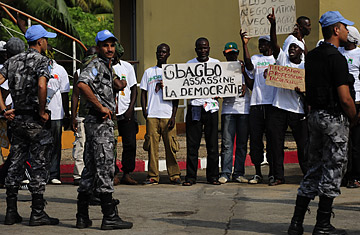
Supporters of Ivory Coast's internationally recognised leader Alassane Ouattara demonstrate, on December 28, 2010, at the Golf Hotel in Abidjan.
It was a remarkable moment, even in the bizarre, tortured political drama that has been Ivory Coast's first presidential election in a decade. Earlier this month as a spokesman for the country's Independent Electoral Commission prepared to read the partial tallies from the November vote live on Ivoirian television, a supporter for then incumbent President Laurent Gbagbo interrupted the broadcast and forcibly tore the results from the officials hands.
The incident provided a telling glimpse into how passionately defiant Gbagbo and his supporters remain in the face of the current political reality in the Ivory Coast (or the Cote d'Ivoire, as it is officially known): by international consensus Gbagbo lost the election to his opponent — and one-time political ally — Alassane Ouattara. Electoral reality notwithstanding, Gbagbo's intransigence has violent implications not only for the Ivory Coast but repercussions for a region inhabited by about 300 million people.
"Beyond Cote d'Ivoire, the way this crisis will be solved will affect the future of democratic elections in Africa," says an Ivoirian executive who wished to remain anonymous out of concern for reprisals. With elections slated in the coming year for Nigeria, Cameroon, Liberia and potentially Niger, he says, "The democratic process has to win."
Nearly a month after his supporter interrupted the televised tally, Gbagbo's defiance hasn't softened. If anything, his supporters appear to be pushing the nation closer to civil war with a United Nations-backed force caught in the middle. On Tuesday, a delegation of presidents from Benin, Cape Verde and Sierra Leone representing ECOWAS (Economic Organization of West African States) arrived to negotiate Gbagbo's departure and, presumably, reiterate stark threat issued last week by Nigerian president Goodluck Jonathan: step down or we will install your opponent through military force. Despite the unprecedented warning, the delegation left Abidjan with little more than the assurance that Gbagbo would see them again. As if to punctuate the delegation's visit, pro-Gbagbo mobs have targeted U.N. convoys with at least two attacks, in one incident firing on vehicles, in another torching one truck and wounding a peacekeeper with a machete.
For the State Department, which has consistently pushed for elections in Ivory Coast, the developments are troubling. "The peaceful resolution of this crisis [is] smack in the middle of the President's first priority and his policy to all of Africa, which is free and transparent democratic elections." said Deputy Assistant Secretary William Fitzgerald for the State Department's Bureau African Affairs. On Wednesday afternoon, the State Department disclosed that an RPG hit the U.S. embassy in Abidjan last week. More than half of the American embassy staff has left the capital of Ivory Coast under a "voluntary departure" while the remaining diplomatic contingent is preparing to evacuate, if necessary, according to a State Department spokesman.
Since the death of Ivory Coast's post-colonial strongman, Felix Houphouet-Boigny, in 1993, electoral crises in Abidjan have followed familiar plot points: an election produces a popular nominee for the presidency, the incumbent leader refuses to step down in the face of the results, violent clashes force a mediation between the political parties. The principal players in the power have changed little. The two men at the center of today's crisis — Gbagbo and Ouattara — have appeared opposite one another in the Ivoirian political drama since Houphouet-Boigny's death.
But, with entrance of ECOWAS as the potential military enforcer of the elections results changes the storyline for Ivory Coast and for the region. In the past, ECOWAS has interceded only in military crises — Sierra Leone and Liberia — to allow for a political solution. In Ivory Coast, the reverse is true. ECOWAS is threatening military force in response to what is a political crisis — and that raises unprecedented scenarios.
Elections in West Africa have been a bit of gambit in the post-colonial era. They are intended to provide for a bloodless transfer of power. But they have also presaged civil war. Both Liberia's Charles Taylor and Sierra Leone's Foday Sankoh used contested elections as a platform to launch armed revolutions. And both men eventually faced down ECOWAS-sponsored military forces after their rebel armies proved to be more bent on brutality and theft, than on restoring electoral democracy. ECOWAS's military engagement in both countries was indecisive. The force, ECOMOG, not only suffered staggering casualties in both conflicts, it also became embroiled in the morass of lawlessness of each civil war, accused of human rights violations, looting and even of arming rebel factions. (Liberians joked the acronym stood for Every Car or Moveable Object Gone.)
